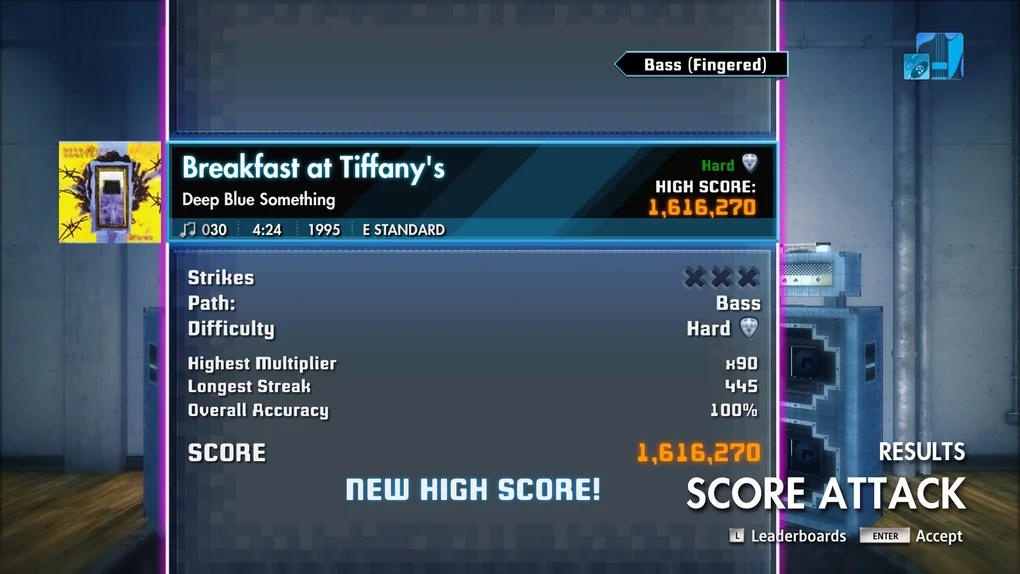Rocksmith Is Dead Again. And This Time, It Might Stick.
Acest articol este disponibil și înromână
• 3 minutes read
Rocksmith was build to teach you guitar, but now it's teacing us about abandonware.

If there’s one game I’d drag into the apocalypse with me, it’s Rocksmith 2014.
I’ve spent countless hours with it, learning guitar and bass, jamming out to my favorite songs, and even picking up a few new skills along the way. It’s been my go-to for years, a reliable companion in my musical journey.
Old, unmaintained, still unmatched. Updated last night to macOS 15.4 and boom - tits up. No fix. No patch. Just silence.
It’s like a bad breakup. I’m left staring at the screen, bass guitar in hand, and all I can think is: “What the hell happened?”
RIP to my muscle memory and hope to become the next basement Clapton.
Rocksmith 2014 Remastered isn’t just a game. It’s a tool. It teaches you actual guitar or bass, note for note, lick for lick, down to every frustrating bend you’ll ever butcher. It’s the closest thing we’ve ever had to gamified mastery of a real instrument, with visual feedback, personalized progression, and a genuinely addictive feedback loop. And it works. Worked.
The problem is, it’s also a product. A commercial one, built on licensed music. Built for platforms that evolve whether the software wants to or not. And Ubisoft, for all its strengths, didn’t build Rocksmith 2014 to live forever.
Here’s where the cracks show.
Like many titles that rely on music licensing, Rocksmith’s longevity in the shape and form we evisioned, was never guaranteed. Tracks get pulled. DLC can disappear overnight. The music industry is fast and hot tempered.
Remember what happened to GTA: Vice City when the music rights expired? One day you’re gunning down gangsters to Michael Jackson. Next day, the game gets pulled from online storefronts, denying a new generation of gamers the privilege to play it. Rocksmith is no different. Once those contracts expire, the songs go with them.
But licensing is only half the problem. The other half is what happens to a game that is so unique and so fundamental to a category of people that it can't easily get replaced. Think insulin but for the soul.
Rocksmith 2014 has been end-of-life for a while, and everybody knew and expected that. It’s not getting regular patches. It's not on life support. It's been pushed into the corner while Ubisoft shifts focus to Rocksmith+, a subscription-based reboot that lacks the soul and self-contained magic of its predecessor.
So when macOS 10.15 Catalina came out and killed 32-bit apps? Rocksmith died on Mac. For a while. Ubisoft actually did patch it-miraculously-and gave Mac users one last shot. And then another while transitioning from Intel to Apple silicone during the times of the Great Ventura. But it felt like a mercy act, not a commitment.
Now, fast forward to macOS 15.4. Same story. The game boots, then crashes. No warning. No workaround. You’re stranded unless you downgrade or boot up an old machine. Forums are already filling up with desperate posts, half-hoping for another patch, half-resigned to plugging into silence.
With no updates in sight, it’s safe to assume we’re on our own again. And yet, “on our own” isn’t quite the full story. Because, where Ubisoft turned off the lights, the community lit a bonfire.
Enter CustomsForge, the unofficial beating heart of Rocksmith. For years, it’s kept the game alive through custom song creation (CDLC), tools, forums, and a shockingly well-organized library of playable tracks the official store never offered. Everyone knew it was technically copyright infringement. Ubisoft did too. But instead of sending takedowns, they looked the other way. The quiet understanding was simple: if you bought the game and treated official DLCs with the respect they deserved, they’d let you mod the game and "chart" your own music files.
This silent deal kept Rocksmith breathing long after official support faded. And the community didn’t just survive - it thrived. They translated tools, wrote manuals, created importers, and pushed the limits of what the game could do.
Ubisoft never formally endorsed it, but they didn’t stop it either. And that decision, deliberate or not, gave Rocksmith its extended second life, despite the fact Rocksmith players are held hostage by platform decisions and licensing contracts.
What happens now is frustrating, because ROcksmith is - and never was - a niche indie tool. This was a flagship music game. It deserved a better send-off than this limbo state it’s trapped in.
We can hardly debate whether Ubisoft owes us anything. Legally, definitely not. Technically? Well, they do have an alternative product in the form of Rocksmith+, even though it is not available on Mac and is a pale shadow of what 2014 was in terms of content and flexibility.
But Rocksmith 2014 isn’t just some abandoned puzzle game. It trained a generation of guitarists, and for some, became a daily ritual. For others, the only teacher they could afford.
And this legendary, one-in-a-lifetime unholy union of software and notes deserves more than silence, cause it's never been about anything else but loud and furious fretting. It's more than a quiet incompatibility notice buried on a help page. When Rocksmith 2014 finally goes down, i'd have imagined that we'd be fucking pressing F for the respect it deserves, not the X for doubt regarding whether it's Apple or Ubisoft who should be fixing their goddamn product to let us enjoy it for another year.